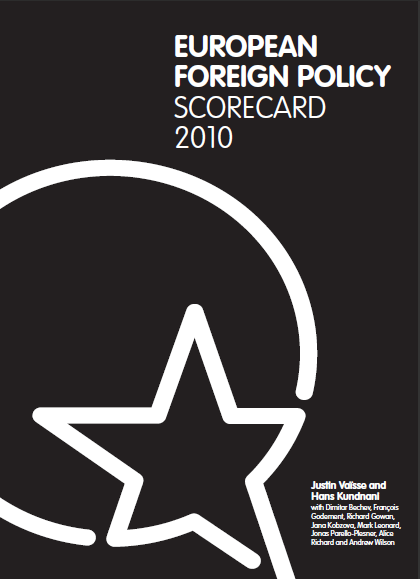European Foreign Policy Scorecard 2010
The 1st edition of the European Foreign Policy Scorecard
Europe’s Foreign Policy Scorecard: Leaders, followers and blockers
The European Council on Foreign Relations today publishes the European Foreign Policy Scorecard 2010, the first comprehensive annual assessment of Europe’s performance on the world stage.
The Scorecard – which looks at how member states and EU institutions contributed to the successes and failures of Europe’s foreign policy – shows how preoccupation with economic crisis led to the marginalisation of foreign policy in national capitals.
The Scorecard grades Europe’s ability to project its influence abroad across 80 categories, grouped into six main themes – relations with China, the US, Russia and Wider Europe, along with multilateral issues and crisis management. ECFR’s European Foreign Policy Scorecard 2010 finds that:
- Europe had some notable successes in 2010. The Scorecard awarded eight A grades, ranging from partnership with the US on terrorism to coordinating an international response to Iranian nuclear proliferation (led by the EU3 and Catherine Ashton). Elsewhere, rapprochement between Poland and Germany helped ‘reset’ relations with Russia, and EU Commissioner Kristalina Georgieva contributed to a strong performance in aiding Haiti.
-
Failingsin other areas resulted in four D grades – on human rights in China; on the Dalai Lama and Tibet; bilateral relations with Turkey; and progress on Cyprus with Turkey. A lack of unity contributed to these failings, along with the actions of individual states, such as Germany, France and Cyprus over bilateral relations with Turkey.
-
European foreign policy tended to succeed when individual countries were united, had strong leadership (as with the EU3 when dealing with Iran) and had learned from past humiliations (as with climate change after Copenhagen).
-
Europe was most dividedover Turkey, relations with the US over NATO, the Millennium Development Goals, Afghanistan, gas pipelines, & human rights in both Turkey and China.
-
Europe neglected its neighbourhood, as Eastern Europe lapsed back into authoritarianism, despite a wave of revolutions in the last decade that echoes the current wave of Arab revolutions. Relations were especially bad with Turkey, although Spain deserves praise for opening a new accession chapter
- Europe also failed to defend its own values – four of the eight lowest scores relate to media freedom and human rights.
“ECFR’s Scorecard is an impressive project that shows European countries that they still have an influential place on the world stage – but only when they pull together in the same direction.”
Vaira Vike-Freiberga and Antonio Vitorino, co-chairs of the Scorecard steering group.
“We greatly appreciate this cooperation with ECFR and we sincerely hope that this project will intensify the dialogue among various European stakeholders – both institutional and from the civil society – with the goal of strengthening our understanding of Europe’s role as a global player.”
Piero Gastaldo, Secretary General of Compagnia di San Paolo, which funded the Scorecard.
The European Council on Foreign Relations does not take collective positions. ECFR publications only represent the views of their individual authors.



